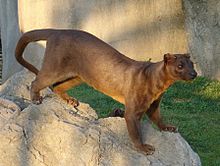Cryptoprocta
| Fossa | |
|---|---|
 |
|
| Scientific classification | |
| Kingdom: | Animalia |
| Phylum: | Chordata |
| Class: | Mammalia |
| Order: | Carnivora |
| Family: | Eupleridae |
| Genus: |
Cryptoprocta Bennett, 1833 |
| Species: | C. ferox |
| Binomial name | |
|
Cryptoprocta ferox Bennett, 1833 |
|
 |
|
| Distribution of Cryptoprocta ferox | |
| Synonyms | |
|
|
The fossa (/ˈfɒsə/ or /ˈfuːsə/; Malagasy [ˈfusə̥]; Cryptoprocta ferox) is a cat-like, carnivorous mammal endemic to Madagascar. It is a member of the Eupleridae, a family of carnivorans closely related to the mongoose family (Herpestidae). Its classification has been controversial because its physical traits resemble those of cats, yet other traits suggest a close relationship with viverrids (most civets and their relatives). Its classification, along with that of the other Malagasy carnivores, influenced hypotheses about how many times mammalian carnivores have colonized Madagascar. With genetic studies demonstrating that the fossa and all other Malagasy carnivores are most closely related to each other (forming a clade, recognized as the family Eupleridae), carnivorans are now thought to have colonized the island once around 18 to 20 million years ago.
The fossa is the largest mammalian carnivore on the island of Madagascar and has been compared to a small cougar. Adults have a head-body length of 70–80 cm (28–31 in) and weigh between 5.5 and 8.6 kg (12 and 19 lb), with the males larger than the females. It has semi-retractable claws (meaning it can extend but not retract its claws fully) and flexible ankles that allow it to climb up and down trees head-first, and also support jumping from tree to tree. The fossa is unique within its family for the shape of its genitalia, which share traits with those of cats and hyenas.
...
Wikipedia

